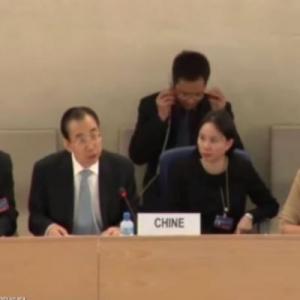On March 20, during the Human Rights Council’s consideration of China’s Universal Periodic Review outcome report, China exhibited a hostility towards civil society voices that made clear its determination to control who can speak, and the content and form of that expression. When an NGO attempted to observe a moment of silence for the death of rights defender Cao Shunli (曹顺利), China raised a point of order that Council rules only allow for “general comments,” which, they maintained, do not include silence. China and its supporters warned that allowing a moment of silence would set a dangerous precedent. When another NGO began to deliver a joint statement, China also argued that accredited NGOs may only reference other accredited organizations, in flagrant contradiction with practices observed by the Commission on Human Rights and the Human Rights Council.
“Domestically, Chinese authorities use detention, disappearances, intimidation and harrassment of defenders and their families, and non-renewal of lawyers’ licenses as means of control. Lacking these tools in the international arena, China resorts to procedural maneuvering,” said Sharon Hom, Executive Director of HRIC. “China’s assertion that accredited NGOs must limit themselves to mentioning only other accredited NGOs in oral statements is deeply troubling in light of its leading role in blocking NGO accreditations to the UN and other international fora.”
A number of governments, including, Canada, EU, France, Germany, Ireland, the UK and United States, spoke out, affirming respect for freedom of expression and their strong support for independent participation of civil society at the UN.
The March 20 Human Rights Council session took place less than a week after rights defender Cao Shunli’s death, a tragic end to her ordeal that began with her disappearance by Chinese authority in September 2013 while en route to Geneva to attend a civil society training session one month before China’s UPR, followed by six months in detention. It was evident that her persecution was a direct result of her active use of China’s legal system in recent years to press the Chinese authorities to allow citizen participation in China’s UPR process. There are also concerns from various communities that she died because she was denied medications and treatment, while in custody, that she had needed for her various ailments.
Her disappearance last fall prompted rising concerns by many governments and high-level international authorities over China’s strong-armed tactics in preventing civil society participation in its UPR process—concerns expressed in government and expert statements both before and during China’s UPR last October, as well as in the March 20 session. Several governments also expressed their concerns regarding the circumstances of Cao Shunli’s death. Most pointedly, the representative of Germany said: “For taking this [UPR] engagement seriously, Mrs. Cao Shunli has paid with her life.”
At the end of the session, the Human Rights Council formally adopted the outcome report for China’s second UPR, a comprehensive evaluation of its human rights obligations under the UN system. China accepted 204 of the 252 recommendations from UN member states. This high acceptance rate is not surprising in light of the overwhelming number of governments that were eager to assure China of their support at its UPR last October. Of the 204 accepted recommendations, China stated that 31 have already been implemented, and 8 are being implemented. Regarding the rejected recommendations, it stated that they are “not practicable and were at odds with realities in China.”
